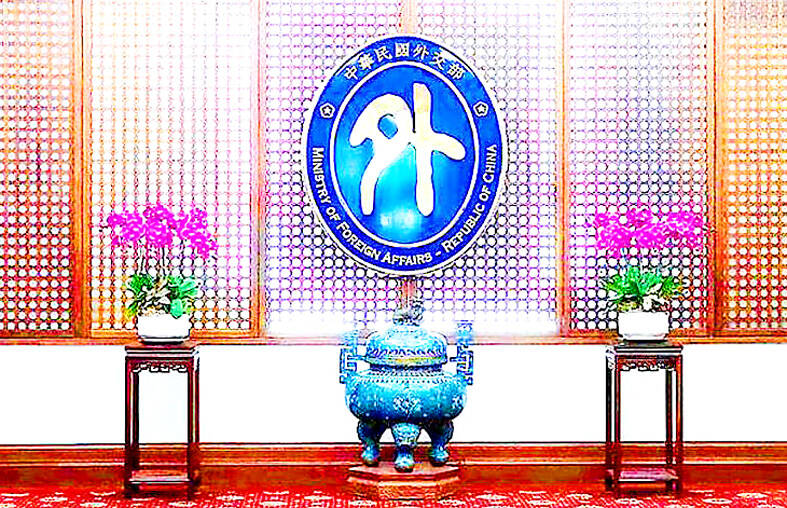Japan and France on Saturday agreed on a new road map for collaboration in the Indo-Pacific region which emphasizes the importance of maintaining peace and stability in the Taiwan Strait and support for Taiwan’s meaningful participation in international organizations.
The agreement was announced following a telephone conversation between Japanese Prime Minister Fumio Kishida and French President Emmanuel Macron in the United Arab Emirates.
In Taipei, the Ministry of Foreign Affairs (MOFA) welcomed the announcement and expressed gratitude for the countries’ support.

Photo: Yang Cheng-yu, Taipei Times
The agreement, under which Japan and France would collaborate on regional issues through 2027, reaffirms that peace and stability in the Taiwan Strait is indispensable to global security and prosperity, encourages the peaceful resolution of issues concerning the Strait and supports Taiwan’s meaningful participation in international organizations.
The two countries also said that they oppose any action that would increase tensions and endanger regional stability, freedom of navigation or the international order.
They expressed strong concern about the situations in the East China Sea and the South China Sea, and called for tensions in the Indo-pacific region to be resolved through dialogue.
Japanese public broadcaster NHK reported that Kishida and Macron also agreed that their governments would enhance joint military training and drills.
MOFA said it appreciates Tokyo and Paris expressing their opposition to any actions that would increase tensions in the region and endanger stability or freedom of navigation.
Peace and stability in the Taiwan Strait is vital to security and prosperity in the Indo-pacific region, and the ministry welcomes any actions by global leaders to help maintain that peace, it said.
Taiwan, an important and responsible country in the Indo-Pacific region, will continue to deepen its cooperation with the US, Japan, European countries and other liked-minded nations to maintain peace, stability, openness and prosperity in the Indo-pacific region, it said.

The CIA has a message for Chinese government officials worried about their place in Chinese President Xi Jinping’s (習近平) government: Come work with us. The agency released two Mandarin-language videos on social media on Thursday inviting disgruntled officials to contact the CIA. The recruitment videos posted on YouTube and X racked up more than 5 million views combined in their first day. The outreach comes as CIA Director John Ratcliffe has vowed to boost the agency’s use of intelligence from human sources and its focus on China, which has recently targeted US officials with its own espionage operations. The videos are “aimed at

STEADFAST FRIEND: The bills encourage increased Taiwan-US engagement and address China’s distortion of UN Resolution 2758 to isolate Taiwan internationally The Presidential Office yesterday thanked the US House of Representatives for unanimously passing two Taiwan-related bills highlighting its solid support for Taiwan’s democracy and global participation, and for deepening bilateral relations. One of the bills, the Taiwan Assurance Implementation Act, requires the US Department of State to periodically review its guidelines for engagement with Taiwan, and report to the US Congress on the guidelines and plans to lift self-imposed limitations on US-Taiwan engagement. The other bill is the Taiwan International Solidarity Act, which clarifies that UN Resolution 2758 does not address the issue of the representation of Taiwan or its people in

SHIFT: Taiwan’s better-than-expected first-quarter GDP and signs of weakness in the US have driven global capital back to emerging markets, the central bank head said The central bank yesterday blamed market speculation for the steep rise in the local currency, and urged exporters and financial institutions to stay calm and stop panic sell-offs to avoid hurting their own profitability. The nation’s top monetary policymaker said that it would step in, if necessary, to maintain order and stability in the foreign exchange market. The remarks came as the NT dollar yesterday closed up NT$0.919 to NT$30.145 against the US dollar in Taipei trading, after rising as high as NT$29.59 in intraday trading. The local currency has surged 5.85 percent against the greenback over the past two sessions, central

‘MISGUIDED EDICT’: Two US representatives warned that Somalia’s passport move could result in severe retaliatory consequences and urged it to reverse its decision Minister of Foreign Affairs Lin Chia-lung (林佳龍) has ordered that a special project be launched to counter China’s “legal warfare” distorting UN Resolution 2758, a foreign affairs official said yesterday. Somalia’s Civil Aviation Authority on Wednesday cited UN Resolution 2758 and Mogadishu’s compliance with the “one China” principle as it banned people from entering or transiting in the African nation using Taiwanese passports or other Taiwanese travel documents. The International Air Transport Association’s system shows that Taiwanese passport holders cannot enter Somalia or transit there. The Ministry of Foreign Affairs (MOFA) protested the move and warned Taiwanese against traveling to Somalia or Somaliland